Source: Temperature Record
"I have no money left, I am going back to find a job."
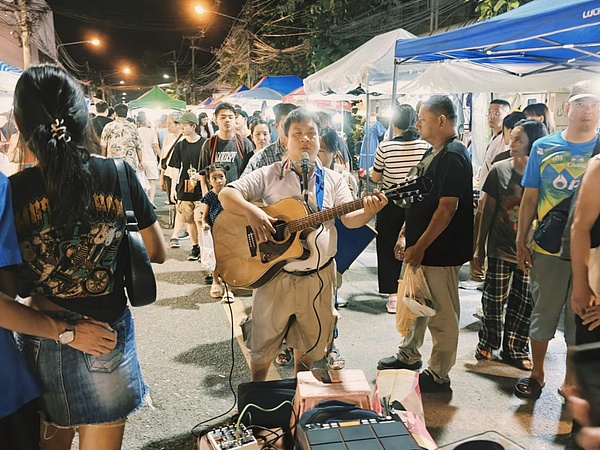
On the streets of Chiang Mai in the early morning, Jane looked up and said to me. Jane is 25 years old and from Yunnan. This is not the first time she has had to interrupt her journey, return home, find a job, save money, quit her job, and then continue on the road.
This time she stayed in Chiang Mai for a particularly long time, and she didn't remember how many times she had spent her savings. She was curious about how other young people could make money while traveling.
After all, in the philosophy of most Chinese people, survival is more important than faith, and travel is just a spice sprinkled on survival.
For a long time, people in ancient narratives have always had to leave their homeland to survive, go to Guandong, go to Southeast Asia, and leave their hometowns to make a living. In the digital age, foreign lands have become the current young people's exploration of distant places and even the daily life - transnational digital nomads, such a group has emerged.
Chiang Mai, backed by Thailand's highest peak, Mount Inthanon, and the digital nomads wandering in this ancient city, have their own logic about survival and freedom.
01 Restarting the Lies of Life
"I knew about Web 3 when I was in high school, but I did two internships in Internet companies during college. I found that I didn't like the work pace of large companies. Finally, before graduation, I found a company in the Web 3 industry and have been working there until now."
Zoe, a Shenzhen girl born in the 2000s, is the youngest member of the digital nomad community I met in Chiang Mai. She has a wheat-colored skin that is unique to Southeast Asian islanders. Not long after graduating from college, she has achieved the WLB (Work Life Balance) balance of life and work that many people dream of. She traveled and worked in Dali, Shenzhen, Chiang Mai, Bali and other places with some friends in the community. It sounds like a life trajectory that only a white girl would have.
During my journey in Southeast Asia for more than half a year, Zoe is one of the few examples I met who took the first step into digital nomadic life in her career. And more young people aim to escape from Beijing, Shanghai, Guangzhou and Shenzhen and rebuild their lives in foreign countries in Southeast Asia.
Before this, I saw more nomads who had gone through many twists and turns. Sometimes they were eager to pursue exploration, and sometimes they waited passively. No matter what, they just lived in a foreign country.
This is very different from the image of nomads created on domestic social media platforms.
It is neither labeling bravely rebelling against meaningless "shit jobs" nor pursuing personal spiritual freedom. From then on, the sun, the beach, and the sea have realized the restart of life through digital nomadism.
It is also not the so-called "demystification" of digital nomads. After quitting their jobs in a hurry, they saw Cangshan and Erhai Lake and traveled around the world. Suddenly, they understood the meaning of life and announced to the outside world that digital nomads were just a game of traffic monetization, and finally took the old path of "selling courses and cutting leeks" of Douyin and Xiaohongshu.
Just like what Guevara wrote in his diary when he traveled around South America on a motorcycle: "I feel that I am different now than when I first set out." Digital nomads also have so-called "life moments".
In the dilapidated Malay passenger ship that is bumping in the wind and waves of the South China Sea, on the motorcycle that shuttles through the shadows of the ancient city walls of Chiang Mai, in the back of a pickup truck that is speeding on the slippery roads of the tropical cloud forest near the equator. Every time I am in the hot and sticky air of the Southeast Asian wilderness, the familiar feeling of floating always comes. In every unknown journey, it will suddenly come at a certain moment and then quickly fade away.
This makes many young digital nomads nostalgic and linger.
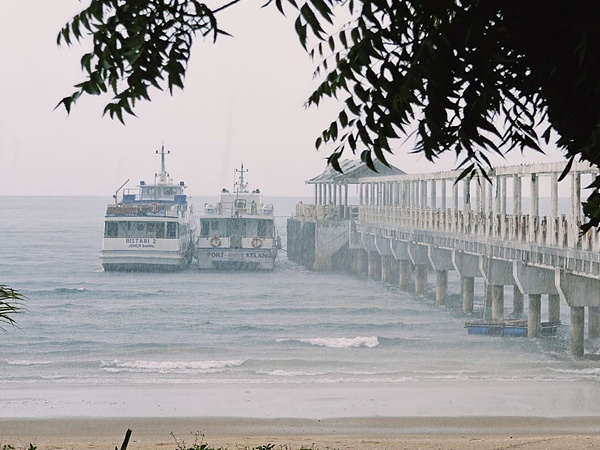 Ferry at a Malaysian port
Ferry at a Malaysian port
However, even in Southeast Asia, trivial and helpless daily life is equally unavoidable.
The nomadic lifestyle is not a panacea for life. In Chiang Mai, a nomadic city with low consumption, friends often complain to me about the difficulty of gaining a foothold overseas - because the client has not settled wages for a long time, when they were the poorest, they only had a few hundred Thai baht left, and had to rely on loans to tide over the difficulties.
In his book Good Questions and Wonderful Answers, Venerable Dhamika, an Australian Theravada Buddhist monk, said: "People go to holy mountains, holy forests, and holy places because of fear."
In the original text, this sentence lacks context. People may be trapped in their comfort zone because of their fear of the outside world, but for nomads, foreign lands are not utopias, and exploring outside is also a fear of following the rules.
Young migrant workers who have lived in cities for a long time are tired of the life of three points and one line, everything is aligned with money, and lack of sense of meaning. They are anxious about the future and lose the present; in Chiang Mai, where coffee and hobbies can be easily realized, there are also many nomads who spend their days in chaos in the upside-down daily routine, wandering in cafes and bars.
It can be confirmed that in the ancient city of Chiang Mai, where there is a building every five steps and a temple every ten steps with a strong Buddhist atmosphere, the lifestyle of many digital nomads is also difficult to escape the shackles of survival itself.
Alcohol, tobacco, how many places you have been to, how many powerful people you have met, superficial freedom cannot constitute the flow of life.
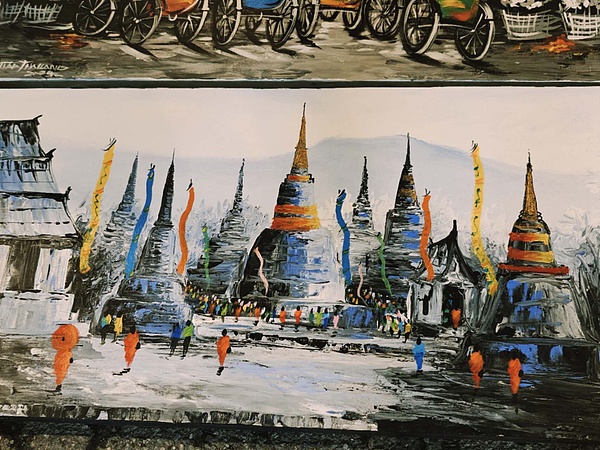 Monks and pagodas in local paintings
Monks and pagodas in local paintings
In 2021, international consulting firm MBO Partners conducted a survey on "The Digital Nomad Search Continues", which showed that most digital nomads would not continue their lifestyle for more than three years.
3 years, this time limit is a curse for these adventurers who are confident in mastering their youth.
02 Wilderness or track?
Compared to the bustling and overcrowded Bangkok, Chiang Mai with few tourists in the rainy season is another world.
Ride a motorcycle and drive in any direction around the ancient city for less than an hour, you can see the continuous green covering the mountains and fields, occasionally dotted with dark and quiet ponds. In the evening, the noisy roar of the throttle will also become quiet with the sky, and all you can see are large clouds above your head. If you are lucky, the stars will appear behind the clouds blown away by the mountain wind. This also makes Chiang Mai always regarded as an ideal place for meditation and seclusion.
Jun An, who is over 30 years old, moved to Chiang Mai from Dali last year. He and his workplace are hidden in the mountains on the outskirts of Chiang Mai.
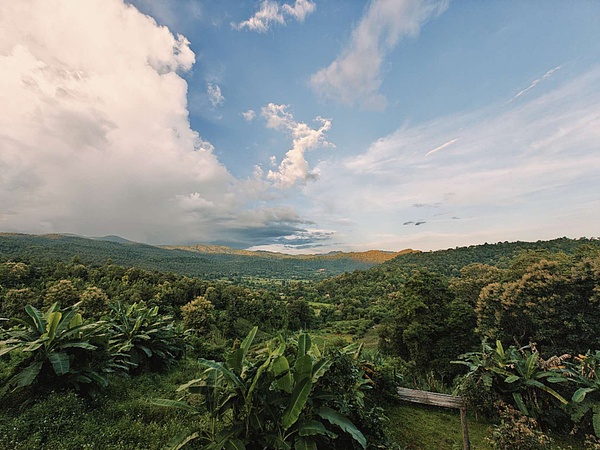 At the foot of Mount Inthanon
At the foot of Mount Inthanon
Strictly speaking, Junan is not a typical digital nomad, because his job does not require the Internet.
From the perspective of people who have lived in cities for a long time, Junnai and his work may experience absolute freedom - he is a practitioner of body, mind and spirit.
He will take students to play guitar, blow the Didgeridoo (a traditional instrument of the Australian Aboriginal tribe, one of the oldest instruments in the world), dance, sing divine songs in the wilderness, set up statues of gods, burn incense, and arrange herbs of different smells in the attic full of Southeast Asian tropical atmosphere, leading people into a "spiritual journey".
Jun'an is a music teacher in Dali. Whenever life needs a little freshness, he will go to the rainforests of Southeast Asia and the mountains of Chiang Mai. Then he became the representative of wilderness and freedom in the eyes of others.
"So will these connections between body, mind and spirit make your real life better?" My question is very utilitarian.
"Well, it does." Jun'an pondered for a moment. "I am more concrete about what I want. For example, most of the people who come to participate in our spiritual ceremony are foreigners. At this stage, my goal is to hope that more Chinese people can experience the spiritual world."
Many of the founders, investors and people in the Web 3 industry of domestic technology companies who experienced the ceremony, "Everyone generally feels good, and more than 80% of people will come again."
The connection between body and mind may have broken through the class, but participating in body, mind and spirit courses is quite a threshold-starting at 10,000 yuan each time. In Chiang Mai, the per capita GDP in 2021 is about 135,991 Thai baht (about 28,000 yuan).
One of the core reasons why digital nomads can seem relatively free is geo-arbitrage, earning US dollars and RMB between the blurred lines of different worlds. Junan's life and career in Chiang Mai, where prices are relatively low, are indeed getting better and better as he hoped.
Outside the Web 3 industry cluster, the life of digital nomads is not as comfortable as imagined, especially for those who want to become digital nomads by changing their careers because their professions are not suitable for remote work.
Jane, who has traveled abroad many times, will carefully calculate her daily living expenses. She will look for various purchasing opportunities and ask other nomads about their ways to make money.
When the accommodation price of Mad Monkey (a well-known affordable youth hostel chain brand in Southeast Asia) exceeds 300 baht (about more than 60 RMB), she will immediately open the hotel and accommodation software to find a substitute. She controls her daily meal budget within 100 baht, and she rarely participates in activities such as Chiang Mai's popular elephant protection and watching Muay Thai matches.
 Local band in Chiang Mai performs for flood relief
Local band in Chiang Mai performs for flood relief
Another example of a relatively smooth transition is A-Lian, who quit her job at a major domestic Internet company.
On social media, an important theme of A-Lian's self-media channel is to explore how digital nomads around the world make money to support their global travel life.
"I taught myself Web 3 development for more than a month, and quickly mastered the front-end three-piece set and REACT, blockchain development, and Solidity development. I also listened to industry podcasts, attended online conferences, and read news. I did some simple small projects on GitHub and wrote a LinkedIn profile carefully. I thought about joining the community and doing some simple projects on Twitter first, accumulating practical project experience, and then slowly changing careers and positions. Unexpectedly, I could chat with the founders directly. Maybe my sincerity touched the big guys. I got the opportunity to join the industry at the end of August and can join the project team. Everything started from 0 to 1, starting from an intern."
Beside the rippling swimming pool, under the bright floor-to-ceiling windows, nomads like A Lian will guard a table, face their work tools, and bury their heads in the keyboard. The quiet and urgent atmosphere is like returning to the postgraduate study room of the university library.
If the digital nomads from China to Chiang Mai have more or less the unique depth of East Asians and faces full of stories. White people who live in Chiang Mai have a sense of relaxation that is hard to imitate. Traveling to Southeast Asia and flying to Australia for a WHV (Working Holiday Visa) seems to have become a trend for young people in Europe and the United States to spend their youth exploration period. Foreign backpackers and Chinese tattoos on their backs. William, a French guy I know, occasionally takes part-time jobs with unemployment insurance, so he doesn't have to worry about the gap year and wanders around Singapore, Malaysia and Thailand for half a year; the Australian punk guy works two to three months a year, and then rides a motorcycle bought in Laos to travel around Southeast Asia for the next half year; the New Zealand girl I met at the Chiang Mai Youth Hostel doesn't have to worry about retirement issues at all. Even if she has never worked or paid personal insurance, she can still receive a pension without a difference when she retires.
Chiang Mai has exquisite shared spaces with a petty bourgeoisie atmosphere on Nimman Road, and dark rooms in low, old buildings near the Ping River, just like Western white people holding high-exchange currencies and working in Western high-tech welfare enterprises to complete their "geographic arbitrage". Digital nomads of different cultural classes in Chiang Mai also have their own wilderness and tracks, but some people are born in the "wilderness" in the eyes of others.
Anyone's narrative is not only derived from himself, but also from the history and culture behind it.
As the French writer Eribon said: "This is the place I tried hard to escape from: a social space that I deliberately alienated, a spiritual space that served as a negative example in my growth process, and my hometown that still constitutes my spiritual core no matter how I resist."
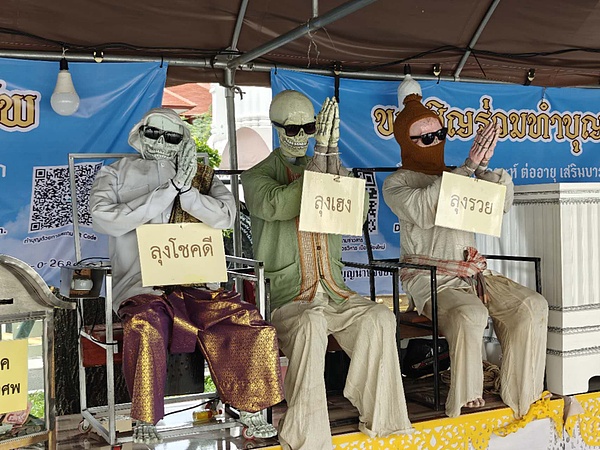 The unique worship of Buddha in a temple in Chiang Mai
The unique worship of Buddha in a temple in Chiang Mai
Acknowledging that some cores still continue as an inseparable part of the body and mind may be the first lesson for digital nomads who go abroad.
03 Back to the real present
"The endless monsoon rain, the otter may turn into a whale again." This is a sentence by the Malaysian Chinese writer Huang Jinshu, because the ancestors of whales are fish that came ashore and evolved into mammals, but returned to the sea for various reasons, and its close relatives are otters.
The rain in Malaysia is like a giant whale returning to the deep sea, and the rain in Chiang Mai is full of the rhythm of life. After each rain, the green outside the window is more vivid, and the ancient city wall is thicker.
Xiao Xia is considered an "otter" in Chiang Mai. After graduation, his first job was as a bank teller in his hometown, a small city, with a stable career system, and a day-to-day life "on the shore". "My daily job is to help the elderly apply for cards to withdraw pension insurance money, and I can fully imagine what the future will look like."
So, Xiao Xia chose to return to the sea.
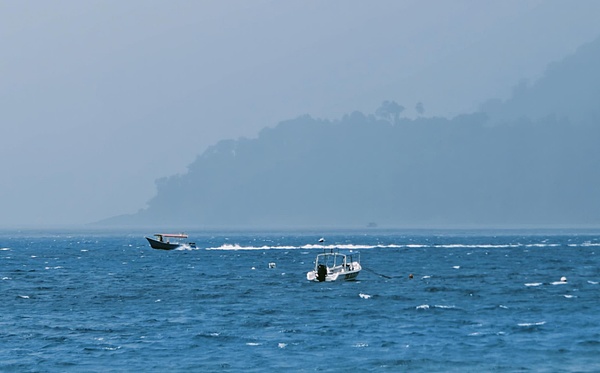 Tioman Island and the South China Sea in the rain
Tioman Island and the South China Sea in the rain
"At that time, cross-border e-commerce was very popular, and I happened to be good at English and applied for an English customer service position. The boss was a foreigner, and the workload was quite relaxed. I gradually got familiar with the industry and started to do it myself."
Xiao Xia began to leave the junior customer service position, from hard-earned hours to gradually being able to take on some cross-border projects on her own, and also took on a remote position. With more money and time, Xiao Xia wandered in digital nomad communities such as Anji, Jingdezhen, Dali, and then Singapore, Penang, and Chiang Mai.
After becoming a digital nomad, Xiao Xia's work and life have improved, so when she suddenly decided to return to China to work at the end of the year, people around her were surprised. "I can get a senior management position when I go back, and this position can connect to some resources through the company's platform, and I won't give up the current cooperative work." Xiao Xia looked very excited.
Most people vaguely feel that it was a long time ago that they were so happy because of their work. Now, people tend to feel impatient with the daily present, and think that a better life must be in the future. In the end, in one dry and solidified day and night after another, they left their work and friends behind and looked around in confusion.
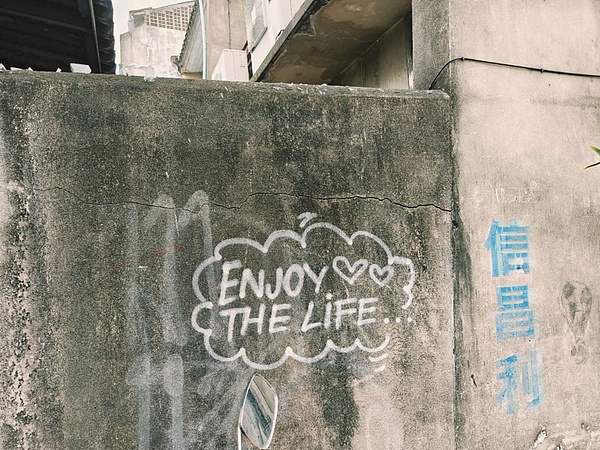 ENJOY THE LIFE Chiang Mai Street Graffiti
ENJOY THE LIFE Chiang Mai Street Graffiti
Xiang Biao, the spiritual mentor of young people, said that Chinese people are all living a suspended life. It is not important whether they can enjoy themselves now, but the moment when they may collapse in the future is important.
Xiao Xia is a counterexample. For her, being a vagrant or not is not the main theme of life, but just a lifestyle that she actively chooses.
People who have lived in cities for a long time have invested excessive imagination in the life of nomads, just like the line from the movie "Into the Wild": "It is undeniable that 'freedom' can always make people feel excited and happy. Because it is accompanied by an escape from history, oppression, rules, and those boring obligations and responsibilities. The so-called absolute freedom."
It is impossible for people to be surging all the time, and everything will eventually return to the mean.
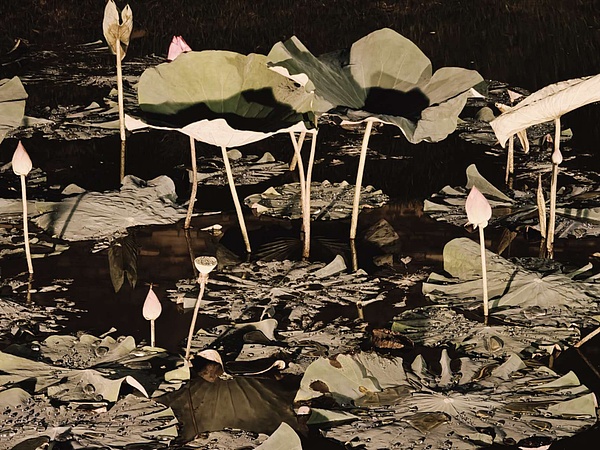 Lotus in the moat of Chiang Mai
Lotus in the moat of Chiang Mai
But for Xiao Xia, when she chose to jump back to the sea from the shore, it meant that a "baby whale" could migrate from the warm tropical breeding area to the polar regions to find food.
As a person used to seeing young people coming and going, Ziyi, the manager of the Digital Nomad Community, never cares where people who enter the community come from, what they are doing, or where they are going. She hardly cares, as she believes that the community will naturally include all kinds of people.
A game geek left a brand new PS5 here, and then someone contributed "Black Myth: Wukong" and "Elden Ring"; Lao Ai, who runs a hookah business, bought two sets of hookah equipment to satisfy his cravings, which made the hookah party every night a regular nighttime program in the community, and even the hookah master was passed down to the fifth generation; local employees in Chiang Mai in the community can decorate the flower beds, courtyards and other decorations according to their own preferences, and there are small surprises hidden everywhere in the public space.
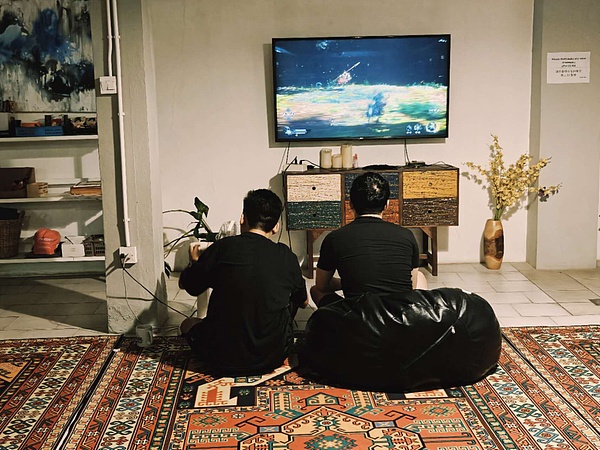 Play Black Myth in the community
Play Black Myth in the community
"See what it will become."
In addition to cooperating with homeless communities such as DNA, NCC, 706 Youth Space, Shanhaiwu, and WaMao, and Web 3 communities, Ziyi also plans to incorporate some feminist communities in the next step. "I don't really want to label the inn, but the community itself. It welcomes any normal human being."
Homeless people are mobile, including the community itself. Some people leave, but still want to come back, and some people have been there, but there is no special reason.
“People who fit into the nomadic community tend to stay here for a long time without realizing it.”
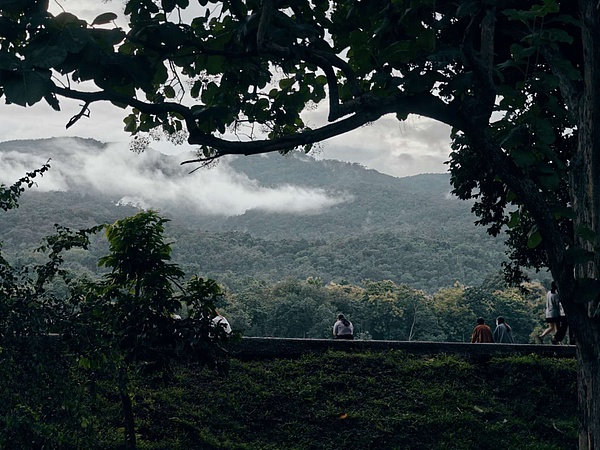 Chiang Mai University at the foot of Doi Suthep Mountain
Chiang Mai University at the foot of Doi Suthep Mountain
At the end of the rainy season in Chiang Mai, a week after Jane left Chiang Mai to return to China, I asked her if she had found a new job. There was a moment of silence on the other end of the phone:
“Wish I could become a digital nomad soon.”
“You don’t need a lot of money.”
“It’s enough to support my wandering.”
Note: The characters in this article are all pseudonyms; the pictures are all taken by the author
 Anais
Anais















